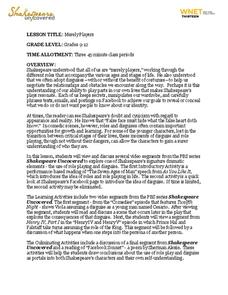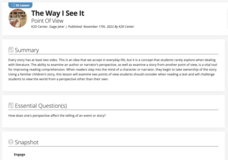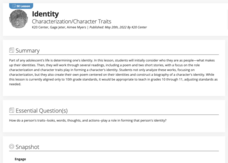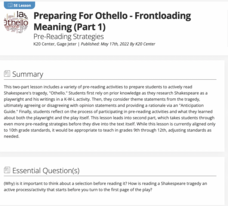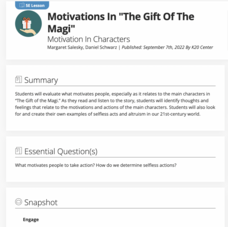What So Proudly We Hail
The Meaning of America: Freedom and Individuality
What are the strengths and weaknesses of American individualism and independence? Explore these principles through a close reading of Jack London's To Build a Fire, and engage in high-level discussion with your class by analyzing the...
What So Proudly We Hail
The Meaning of America: Enterprise and Commerce
Using Mark Twain's The Man That Corrupted Hadleyburg, invite your learners to consider the concept of virtue in a democratic society devoted to gain and self-interest. This stellar resource guides your class members through a close...
National Endowment for the Humanities
Courage “In the Time of the Butterflies”: A Common Core Exemplar
The courage of Las Mariposas, the Mirabal sisters, is the focus of a series of activities designed to accompany a reading of In the Time of the Butterflies that ask readers to consider what it means to be courageous. Beautifully crafted...
Curated OER
Romeo and Juliet by William Shakespeare
"It is my lady, O, It is my Love!" Provide class members an opportunity to develop their skills reading difficult text with an exercise that focuses on the balcony scene from Romeo and Juliet (Act II, scene ii). Using the provided...
Curated OER
Merely Players
Disguises and role playing are the focus of a resource that uses Shakespeare’s As You Like It, Twelfth Night, and Henry IV, Part I, to demonstrate how we all play many parts in our lives; how we all are “merely players.” The many...
Shakespeare Uncovered
Women’s Roles in As You Like It
“There is nothing that becommeth a maid better than soberness, silence, shamefastness, and chastity, both of body & mind.” This line, from Thomas Bentley ‘s The Monument of Matrons published in 1582, typifies the way women were...
Shakespeare Uncovered
Henry IV, Part I: Does Father Know Best?
“Yea, there thou mak’st me sad and mak’st me sin/In envy that my Lord Northumberland/Should be the father to so blest a son--.” Henry IV, Part I, provides the text for a series of exercises that ask class members to examine the...
Robert F. Kennedy Center for Justice and Human Rights
Juliana Dogbadzi: Slavery/Trafficking
Progress your learners' comprehension of universal human rights by exploring the violation of human trafficking through the experiences of Juliana Dogbadzi. This activity analyzes and discusses very sensistive and graphic issues but is...
Curated OER
What a Character! Comparing Literary Adaptations
What do Robert Downey Jr., Basil Rathbone, Jeremy Brett, Fritz Weaver, Roger Moore, Benedict Cumberbatch, and Daffy Duck have in common? Why, it’s elementary, my dear Watson! They all have portrayed Sherlock Holmes. Literary detectives...
Curated OER
The Merchant of Venice: Anticipation Guide
Is justice blind? Is love blind? Before beginning The Merchant of Venice, readers decide whether they agree or disagree with statements that encapsulate key elements of the tragic comedy. The class then predicts whether Shakespeare will...
Texas Education Agency (TEA)
Archetypes, Motifs, and Plot in Drama (English II Reading)
The second interactive in a series of 10 introduces young scholars to character archetypes, archetypal plot patterns, and archetypal motifs, including the use of color. Learners read passages explaining the term and study examples from...
Utah Education Network (UEN)
Character Changes Lesson and iPad Assignment
Round, flat, static, dynamic. As part of a characterization study, scholars review the different types of characters and create a slide show demonstrating how a dynamic character in a story they have read changes throughout the tale.
K20 LEARN
The Way I See It: Point of View
Robbers see a house from a different perspective than real estate agents. That's the big idea in a lesson about point of view. Groups assume the role of either robbers or real estate agents, note important details in a description of a...
K20 LEARN
Totally Different Stories: Perspective
Two stories by Kate Chopin provide high school freshmen with an opportunity to reflect on the importance of the perspective from which a story is told. Class members read "The Story of an Hour" and a passage from The Awakening, then...
K20 LEARN
Identity: Characterization/Character Traits
"Who am I?" Guy de Maupassant's short story "The Necklace," Julio Naboa Polanco's poem "Identity," and a clip from a Jason Bourne film provide learners with a context to consider the traits that makeup identity. Scholars create a...
K20 LEARN
Preparing for Othello - Frontloading Meaning (Part 2): Pre-reading Strategies
The second lesson in a two-part series that prepares high schoolers for a study of Othello focuses on additional pre-reading strategies. Pupils reflect on what they have learned and consider what they would like to learn about the play....
K20 LEARN
Preparing for Othello - Frontloading Meaning (Part 1): Pre-reading Strategies
The success of any lesson based on a complex text relies heavily on what instructors do before beginning the reading. Before reading Othello, scholars engage in a series of pre-reading activities, including completing an anticipation...
K20 LEARN
It’s Never Too Late to Apologize: Character Development and Theme in “The Scarlet Ibis”
Sometimes saying I'm sorry just doesn't cut it. Scholars examine a series of apology poems, songs, and stories and consider each speaker's regrets. Using what they have learned, they analyze James Hurst's short story, "The Scarlet Ibis,"...
K20 LEARN
Motivations In "The Gift Of The Magi": Motivation In Characters
O. Henry's short story, "The Give of the Magi," launches a study of what motivates people to act as they do. Class members identify what they believe are the motivations of the characters in O. Henry's tale and then craft a one-page...
Penguin Books
A Guide to the Works of Jacqueline Woodson
The works of Jacqueline Woodson introduce readers to diverse characters and themes. A guide covers many of the author's best-known books such as Brown Girl Dreaming and Locomotion. Dive & Discuss and Explore & Extend activities...
Penguin Books
An Educator's Guide to the Works of Laurie Halse Anderson
Laurie Halse Anderson tackles challenging topics for teens. An educator's guide shares activities for many of her novels such as Prom, Shout, and Wintergirls. Questions, perfect to use as either discussion or as essay prompts, accompany...
K20 LEARN
Texture Poetry: The Great Gatsby and the Sense of Touch
To prepare for crafting a descriptive poem about a character in F. Scot Fitzgerald's The Great Gatsby, groups describe the texture of objects hidden in small bags. Individuals then select a character from the novel and an object...
K20 LEARN
The Most Dangerous Game
Readers of "The Most Dangerous Game" must argue which of Richard Connell's characters is the protagonist or antagonist. The lesson begins with scholars reading selected passages from the story and making predictions about who they...
K20 LEARN
Lord of the Flies Unit, Lesson 4: Bad to the Bone
Is the nature of humans inherently good or evil? That is the question scholars consider in the fourth lesson of the Lord of the Flies unit. In a Four Corners activity, they examine statements about human nature and stand by the poster...






